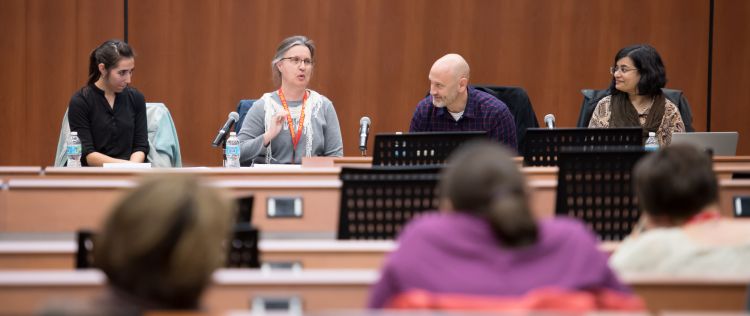Inaugural Go Big Read Panel Discussion considers health and housing

"As doctors, as nurses, as physicians, as providers, please use your voice to advocate for some of these changes," said Sami Kordonowy, MSW, Housing & Hope Case Manager, The Road Home Dane County. “Don’t diminish your voice, because it does matter.”
Her words reached an audience of more than 75 medical students, nursing students, pharmacy students, staff members, resident and fellows, and faculty members, and others who attended the first-ever Department of Medicine Go Big Read Panel Discussion led by faculty moderator Amy Kind, MD, PhD, associate professor, Geriatrics and Gerontology. Using "Evicted: Poverty and Profit in the American City" by UW-Madison alumnus Matthew Desmond as a launching point for conversations, panelists talked about their own perspectives and professional experiences. Their views and stories were informed by multiple experiences: the impact of homelessness on K-12 students, the barriers to affordable housing that families in Madison face, the use of data analysis to understand the effects of state housing regulations and policies, and national trends in eviction as viewed from an urban planning perspective.
The audience wasn't limited to those present in the auditorium, however. Over 300 viewers joined in to view a livestream of the feed on the Department of Medicine Facebook page.
Click on the video above to view the panel discussion in its entirety. To view the introductory video that was shown at the start of the discussion about a housing and health initative from the University of Vermont Medical Center, click here.
The discussion tackled hard topics. Amy Noble, MSW, Social Worker, Madison Metropolitan School District Transition Education Program, talked about the social and educational needs of students and families experiencing long- or short-term homelessness. One poignant example of the impact of housing on health was illustrated by a working mother who had found housing for her two teenaged children but not for herself. She slept in her car at night, in great pain due to needing a hip replacement—and then reported to work each morning. In another example, a mother of two young children accepted an offer of housing from a man who then raped her. She then carried the pregnancy to term and was discharged postpartum from the hospital to homelessness.
Panelist Revel Sims, PhD, assistant professor, UW-Madison Department of Urban & Regional Planning, is an expert in urban housing who co-authored a report entitled “Evicted in Dane County” in fall 2016. He spoke about a dearth of research on the impact of housing instability on health, but mentioned work in the 1960s by Mark Fried finding that individuals who were displaced from housing due to “urban renewal” initatives had high rates of severe depression two years later, with women being more at risk than men.
The panel contemplated systemic needs for affordable housing and more equitable balances of power between tenants and landlords. “In 1970, there were 300,000 more affordable housing units available than there were people who needed them in this country. By 2001, there were 2.7 million more low-income households that needed housing than there were affordable housing units… If we don’t have places for people to go, we can’t solve the problem,” said Noble. For Reka Sundaram-Stukel, PhD, health economist, Wisconsin Department of Health Services, Division of Public Health, the magnitude of the issue is staggering. "As an economist, it's been a relatively new experience to think about these issues as they apply to the US because [with a background in agricultural economics] I am used to thinking about and analyzing developing nations," she said.
Dr. Sims questioned why fundamental disputes about housing are handled in small claims courts, where there is no legal right to representation. And Kordonowy pointed out the extreme lack of affordable housing in the region. “In Madison alone, we have under a 2% vacancy rate. For tenants and landlords to be in a relationship of equal power, there needs to be about a 6-8% vacancy rate,” she said. “In Wisconsin, you have to work 69 hours in order to afford a one-bedroom apartment if you make minimum wage.”
And yet, there are many things that health care providers can do to make a difference, panelists emphasized. In many cases, it starts with trying to view medical situations from the perspective of patients facing housing insecurity or homelessness. “It takes a lot of brainpower to be living in poverty…maybe your health is going to take a back-burner. Transportation is huge…any ways that you can help facilitate some of those rides so they don’t have to rely on [unreliable ride vendors] is helpful,” said Kordonowy.
She continued, “Don’t take things personally…most of the families I work with, their social capital just isn’t there. The more relationships you build with your patients, the better outcomes you’ll have. And a lot of the clients I work with, they don’t get choices. So if you can give them choices of any kind, that’s huge.”
Resources:
- "Evicted in Dane County, Wisconsin: A Collaborative Examination of the Housing Landscape,” Sims R et al., 2016.
- Madison Metropolitan School District Transition Education Program
- The Road Home Dane County
- Wisconsin Department of Health Services – Division of Public Health
- Introduction - 2017 Department of Medicine Go Big Read discussion